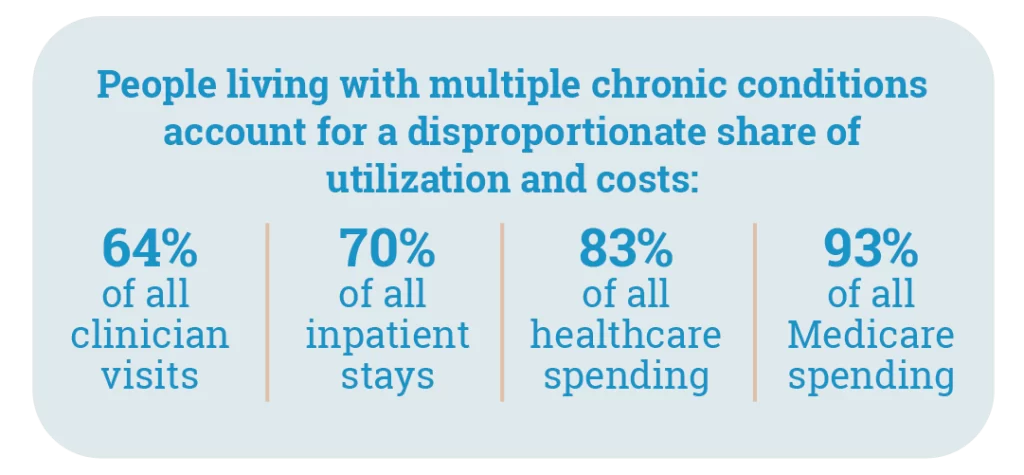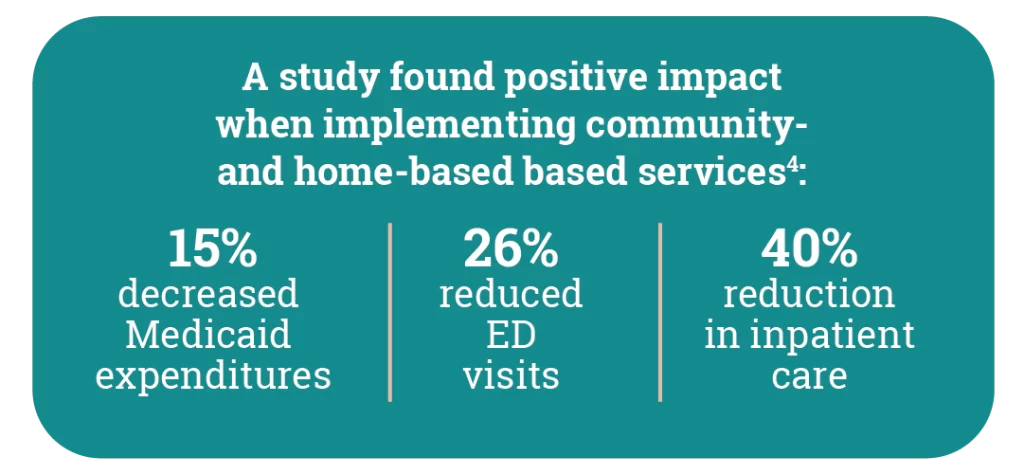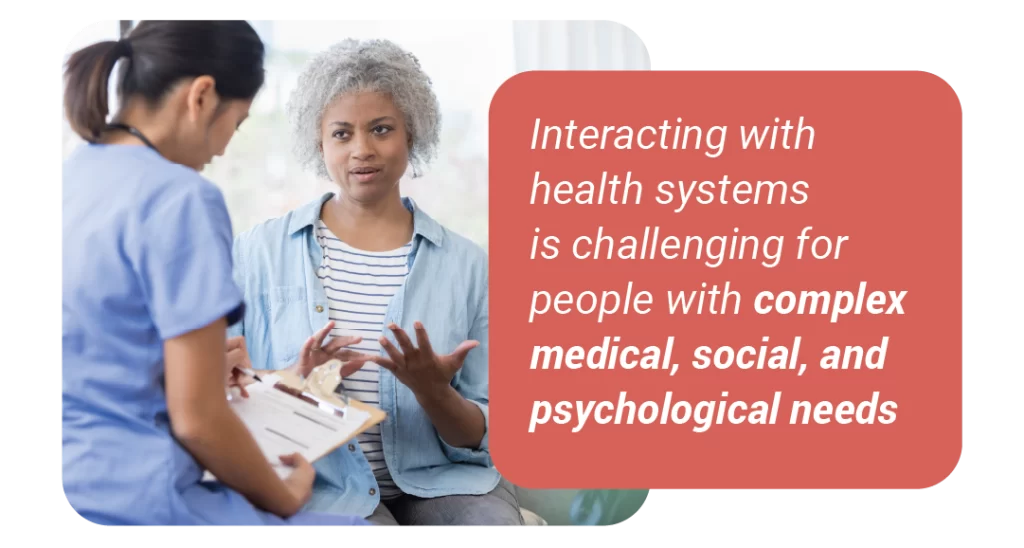Personalized Whole Person Care
By Spiras Health | June 18, 2024

Today, people living with multiple chronic conditions (MCC or “polychronic”) account for a disproportionate share of utilization and costs.1 On top of that, 90% of annual healthcare expenditures in the United States are for people with chronic and mental health conditions. Nearly all readmitted Medicare beneficiaries are individuals with MCC and 35% of all Medicare beneficiaries saw 5 or more physicians in 2019.2

As cited in JAMA Internal Medicine, this fragmentation may lead to medical errors, unnecessary visits, avoidable hospitalizations, and suboptimal care if all of the physicians do not have complete information about the patient and each other’s diagnoses and treatments.
Whole-person Care-at-home –
A Proven Solution
Interacting with health systems is challenging for people with complex medical, social, and psychological needs. They see multiple specialists with separate care plans and typically have been prescribed 10 or more medications. Combined with a lack of access to transportation or conveniently located healthcare facilities, the problem becomes dire.
A whole-person, in-home approach aims to address each of these needs together, rather than piecemeal; a recent study found that a “whole‐person” approach that embraces medical, behavioral, social, spiritual, and economic dimensions requires redesigning care for people living with diseases rather than focusing on specific diseases in isolation.3 Seeing patients in their home where they are most comfortable allows providers to develop a fuller picture of the patient, foster trusting relationships, and create consolidated and individualized care plans that are prioritized according to the patient’s needs and life goals.

A recent example from New York demonstrates the value of investing in community-based services as part of a larger strategy to provide whole-person care including supporting housing initiatives and community care cooperatives. Specifically, the housing initiative resulted in decreased Medicaid expenditures of 15%, emergency department (ED) visits dropped 26%, and the number of days spent in inpatient care dropped 40%. This shows how stable housing can have a substantial impact on clinical outcomes and the cost of care, not to mention quality of life and peace of mind.4
Another finding from the Community Preventive Services Task Force notes that team-based care, comprised of in-home providers, improves patients’ blood pressure.5 A team-based approach, with an in-home provider as a link between patient and plan, furthers health plan priorities by aligning with the new CMS framework for health equity and the corresponding change to its Star Rating system.6,7

Addressing the Whole Person
For Spiras Health, our time in each patient’s home allows us to know patients as individuals and understand how they live their daily lives. We meet caregivers, neighbors, local resources, and the person from their church who checks in on them.
Our unique whole-person approach personalizes care:
1. The home-based advantage
Our monthly visits allow us to enter patients’ lives and develop trusted relationships. In the home, we learn about their barriers to health and how to address them. We gather all medications to review the prescribing physician, dosing, and instructions. Clinicians educate patients in a relatable way on what each medicine is for and how to take it. Our Nurse Practitioners (NPs) may reach out to the patient’s Primary Care Physician (PCP) or specialist to discuss care plans or collaborate on a dose change or refills. We help patients access the care they need through referrals to behavioral health, ordering or arranging for missing tests, assisting in finding a PCP or scheduling a specialist visit.
2. Consolidating care plans
Patients with multiple chronic conditions see multiple specialists and are often confused by what may be conflicting care plans. Spiras NPs review the care plans from each physician and work to consolidate the plans with the patients to:
- Prioritize care plan elements based on what is clinically important to simplify the plan and make it achievable for the patient.
- Educate the patient on their conditions, motivations, and preferences to create a clinically sound care plan individualized to the patient.
- Provide ongoing support toward care plan goals through longitudinal visits from the Spiras clinical field team.
3. A trusted partner
Our patients rely on their Spiras clinicians for education, connection, and aid – many come to think of their clinician as a clinical family member they can rely on for advice and support. Importantly, with patient permission, we involve caregivers and help patients rally the support that will make their lives more fulfilling.
Through earned trust, we empower patients to understand:
- Conditions, triggers, and symptoms to watch for;
- Plan benefits, including supplemental benefits, and how to use them;
- Actions, exercise, and diet changes that can help improve conditions or arrest a decline;
- Local resources, such as food pantries, that can support needs;
- Why health is worth working for and how we support their journey.

Our experience caring for patients in their homes has demonstrated the value of prioritizing care plan elements and supporting patients. Comments we hear from our patients include “I’ve never felt cared for before you came along” and “no one’s ever taken the time to explain things to me before”. These testimonials highlight the success of our whole-person care-at-home program that’s built on trust. We are committed to solving the healthcare system’s fragmentation by delivering equitable care in the home and proven results for our health plan partners and their members.
To learn how to offer Spiras Health to your members with complex needs, contact us using the form below
- https://www.ahrq.gov/patient-safety/settings/long-term-care/resource/multichronic/mcc.html
- https://jamanetwork.com/journals/jamainternalmedicine/article-abstract/2814486
- https://www.ncbi.nlm.nih.gov/pmc/articles/PMC8515222/#hesr13863-bib-0022
- https://www.health.ny.gov/health_care/medicaid/redesign/supportive_housing/evaluation.htm
- https://www.thecommunityguide.org/findings/heart-disease-stroke-prevention-team-based-care-improve-blood-pressure-control.html
- https://www.cms.gov/files/document/cms-framework-health-equity-2022.pdf
- https://www.cms.gov/newsroom/fact-sheets/2024-medicare-advantage-and-part-d-star-ratings

 Prev
Prev